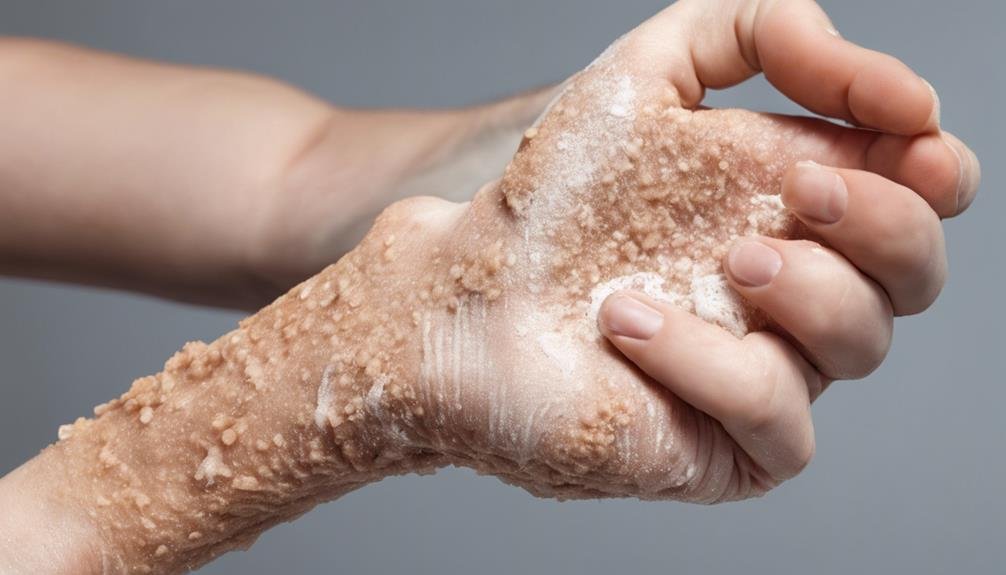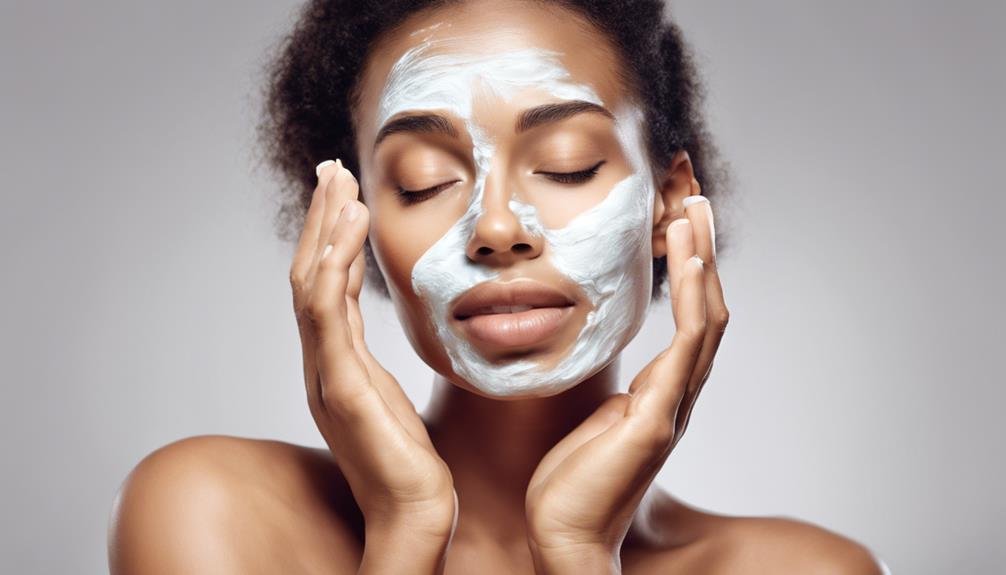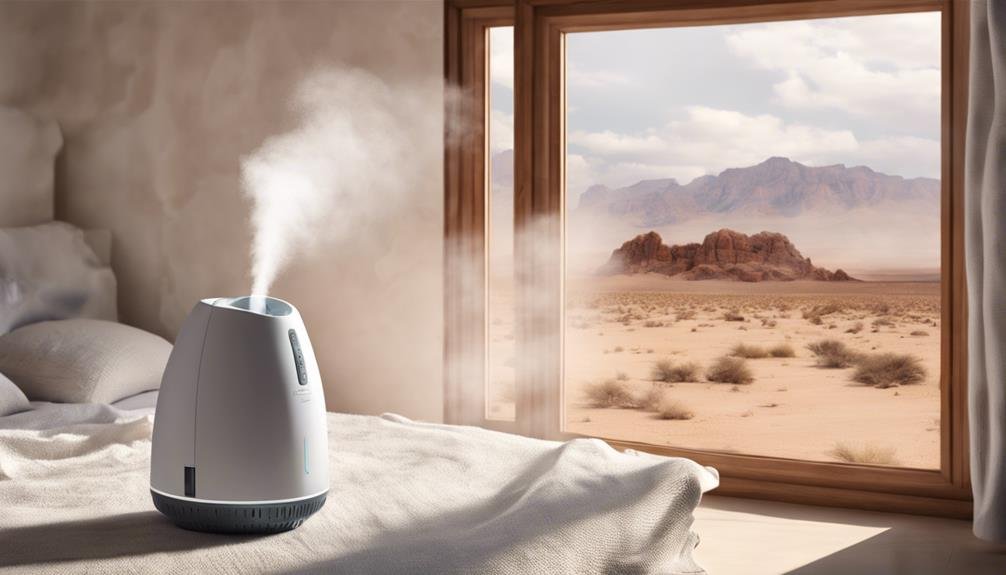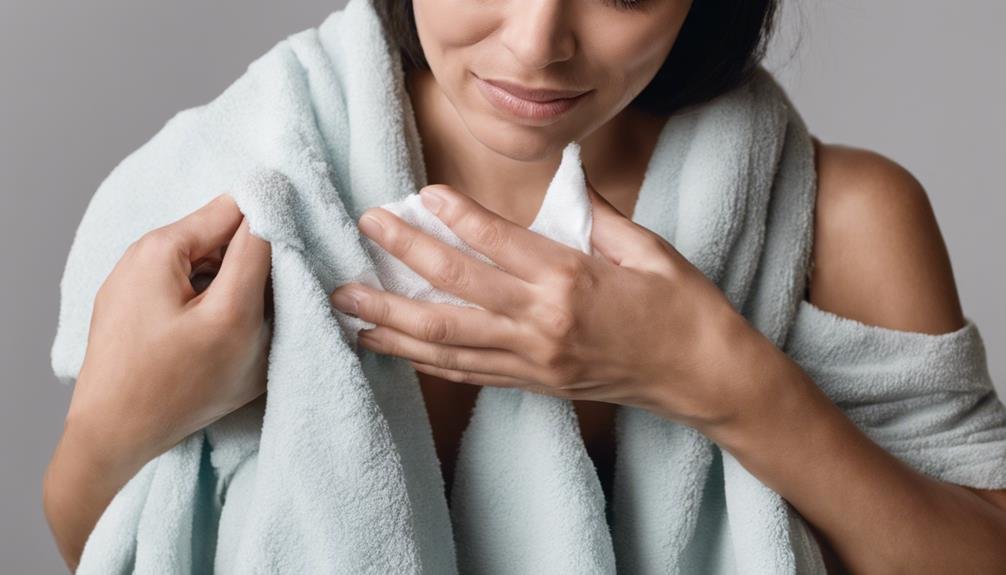If your skin feels like sandpaper instead of silk, it's time to smooth things out. But how can you transform that rough exterior into a velvety soft finish? Let's explore some expert strategies to tackle rough skin and unveil a smoother, more radiant you.
Key Takeaways
- Regular exfoliation to remove dead skin cells and improve skin texture.
- Hydrate skin with moisturizers containing glycerin and ceramides.
- Use a humidifier in dry environments to maintain skin hydration.
- Apply hydrating skincare products with ingredients like hyaluronic acid.
- Avoid harsh soaps and opt for gentle cleansers to prevent further skin dryness.
Importance of Hydration
To effectively treat rough skin, you must understand the critical role that hydration plays in maintaining skin health. Hydration is key to keeping your skin supple, smooth, and radiant. When your skin lacks proper moisture, it can become dry, rough, and more prone to irritation and damage. Dehydrated skin can lead to a compromised skin barrier, making it easier for environmental aggressors to penetrate and cause further harm.
Water is essential for maintaining skin elasticity and promoting cell turnover, which is crucial for achieving a healthy skin texture. By ensuring your body is adequately hydrated from the inside out, you can help your skin maintain its natural moisture balance.
In addition to drinking enough water, using hydrating skincare products containing ingredients like hyaluronic acid, glycerin, and ceramides can also help replenish and lock in moisture.
Gentle Cleansing Techniques
Maintaining healthy skin involves more than just hydration; proper cleansing techniques are also vital in achieving smooth and radiant skin. When cleansing your skin, it's essential to be gentle to avoid further irritation. Here are some tips for effective and gentle cleansing techniques:
| Technique | Description | Benefits |
|---|---|---|
| Use a gentle cleanser | Opt for a mild, soap-free cleanser that won't strip your skin of its natural oils. | Preserves skin's moisture balance |
| Avoid hot water | Wash your face with lukewarm water to prevent drying out your skin. | Helps maintain skin's natural hydration levels |
| Pat dry, don't rub | After cleansing, pat your skin dry with a soft towel instead of rubbing vigorously. | Reduces risk of irritation and inflammation |
| Cleanse twice daily | Establish a morning and evening cleansing routine to keep your skin clean and refreshed. | Helps remove impurities and prevent breakouts |
Benefits of Regular Exfoliation
Regular exfoliation is a crucial step in any skincare routine to achieve smooth and healthy skin. By incorporating exfoliation into your regimen, you can experience a multitude of benefits that contribute to a glowing complexion.
Firstly, exfoliation helps to remove dead skin cells that can clog pores and lead to breakouts, allowing for better absorption of skincare products. It also promotes cell turnover, revealing fresh, radiant skin underneath. Regular exfoliation can improve skin texture, making it smoother and softer to the touch. Additionally, it can aid in reducing the appearance of fine lines and wrinkles by encouraging collagen production.
Moreover, exfoliating regularly can help fade dark spots and hyperpigmentation, resulting in a more even skin tone. It can also prevent ingrown hairs and reduce the likelihood of developing acne. Remember to choose a gentle exfoliator suitable for your skin type and avoid over-exfoliating, as this can cause irritation. Integrate exfoliation into your skincare routine to reap these benefits and achieve a luminous complexion.
Moisturizing Tips and Tricks
For optimal skin health, ensuring your skin is well-moisturized is key. Moisturizing helps maintain your skin's natural protective barrier, preventing dryness and enhancing its overall appearance. When choosing a moisturizer, opt for products that match your skin type. If you have oily skin, look for oil-free or non-comedogenic formulas. Dry skin benefits from thicker, cream-based moisturizers containing ingredients like hyaluronic acid or glycerin. For normal or combination skin, a lightweight lotion may be sufficient.
To maximize the benefits of your moisturizer, apply it to damp skin right after showering or washing your face. This helps lock in moisture and keeps your skin hydrated throughout the day. Don't forget areas prone to roughness, such as elbows, knees, and heels. Regularly exfoliating these areas before moisturizing can further improve their texture.
In addition to your daily moisturizing routine, consider using a humidifier in dry environments to help keep your skin hydrated. Remember to drink an adequate amount of water each day to promote skin hydration from within. By following these simple tips and tricks, you can keep your skin soft, smooth, and healthy.
Sun Protection Strategies
To shield your skin from harmful UV rays and prevent premature aging and skin damage, implementing effective sun protection strategies is crucial. Here are four essential tips to help you safeguard your skin from the sun's harmful effects:
- Apply sunscreen daily: Choose a broad-spectrum sunscreen with an SPF of 30 or higher. Remember to reapply every two hours, especially if you're swimming or sweating.
- Seek shade: Limit your time in direct sunlight, especially between 10 a.m. and 4 p.m. when the sun's rays are strongest. Use umbrellas, hats, or seek shade under trees or canopies.
- Wear protective clothing: Opt for light-colored, tightly woven clothing that covers your arms and legs. Don't forget a wide-brimmed hat and UV-protective sunglasses.
- Avoid tanning beds: Artificial UV radiation can be just as harmful as natural sunlight. Say no to tanning beds to protect your skin from unnecessary damage.
Incorporating Antioxidants
To fortify your skin against oxidative stress, considering the incorporation of antioxidants into your skincare routine can enhance your skin's overall health and resilience. Antioxidants such as Vitamin C, Vitamin E, and green tea extract work to neutralize free radicals, preventing them from damaging your skin cells. These powerful compounds also help combat inflammation, reduce signs of aging, and improve skin texture.
When selecting antioxidant-rich products, look for serums, moisturizers, and treatments that contain these ingredients to maximize their benefits.
Incorporating antioxidants into your daily skincare regimen can provide your skin with added protection and nourishment, promoting a more radiant and youthful complexion. To make the most of these benefits, apply antioxidant products in the morning before sunscreen to boost your skin's defense against environmental aggressors. Over time, you may notice a visible improvement in the overall appearance and feel of your skin, helping to address roughness and uneven texture.
Avoiding Harsh Ingredients
Amidst your skincare journey, it's essential to be mindful of the ingredients you expose your skin to. Here are some key points to consider when avoiding harsh ingredients:
- Fragrances: Opt for fragrance-free products as fragrances can irritate sensitive skin and exacerbate roughness.
- Alcohol: Avoid skincare products containing high levels of alcohol as they can strip the skin of its natural oils, leading to dryness and rough patches.
- Sulfates: Stay away from cleansers and exfoliants with sulfates, as they can be too harsh and drying for rough skin.
- Parabens: Look for paraben-free products to minimize the risk of irritation and allergic reactions, which can contribute to rough skin texture.
Dietary Considerations for Skin Health
Considering your skin health goes beyond just external care; what you consume can significantly impact your skin's appearance and texture. A diet rich in fruits, vegetables, and healthy fats can contribute to smoother, more radiant skin.
Antioxidant-rich foods like berries, spinach, and nuts can help combat free radicals that contribute to skin aging. Omega-3 fatty acids found in fatty fish, chia seeds, and walnuts can help maintain skin elasticity and hydration. Additionally, staying hydrated by drinking an adequate amount of water daily is crucial for skin health.
On the contrary, consuming excessive amounts of sugar and processed foods may lead to inflammation in the body, potentially worsening skin conditions like acne and eczema. Limiting dairy intake has also been linked to improvements in skin clarity for some individuals. Remember, a balanced diet is key for overall skin health. Consider incorporating these skin-loving foods into your meals to promote a smoother, more youthful complexion.
Using Humidifiers in Dry Climates
In dry climates, maintaining optimal skin health can be challenging due to the lack of moisture in the air. To combat the effects of dry air on your skin, using humidifiers can be a simple yet effective solution.
Here are some tips for using humidifiers in dry climates:
- Choose the Right Type: Select a humidifier that suits your needs, whether it's a cool-mist, warm-mist, ultrasonic, or evaporative humidifier.
- Monitor Humidity Levels: Keep an eye on the humidity levels in your home using a hygrometer and aim for a range of 30-50% to ensure optimal skin hydration.
- Regular Maintenance: Clean your humidifier regularly to prevent the growth of mold and bacteria, which can exacerbate skin issues.
- Strategic Placement: Position your humidifier in a central location to ensure even distribution of moisture throughout the room.
The Role of Essential Oils
When it comes to treating rough skin, essential oils can play a significant role in improving skin texture and hydration. Essential oils are natural extracts derived from plants that possess various beneficial properties for the skin. They can help soothe, moisturize, and revitalize your skin, making it smoother and more supple. Below is a table showcasing some essential oils along with their skin benefits:
| Essential Oil | Skin Benefits | Best Used for |
|---|---|---|
| Lavender | Calming, anti-inflammatory | Dry, irritated skin |
| Tea Tree | Antimicrobial, acne-fighting | Oily, acne-prone skin |
| Rosehip Seed | Hydrating, anti-aging | Mature, dull skin |
| Chamomile | Soothing, anti-irritant | Sensitive, redness-prone skin |
| Frankincense | Regenerating, toning | Aging, sagging skin |
Integrating essential oils into your skincare routine can provide a natural and effective way to address rough skin concerns.
Benefits of Cold Compresses
To effectively address rough skin, utilizing cold compresses can offer a range of benefits for improving skin texture and reducing inflammation.
Here are four reasons why cold compresses can be beneficial for your skin:
- Reduced Inflammation: Cold compresses help constrict blood vessels, reducing swelling and inflammation, which can be particularly helpful for conditions like acne or sunburn.
- Improved Circulation: The cold temperature can enhance blood flow to the skin, promoting better circulation and aiding in skin rejuvenation.
- Soothing Sensation: The coolness of the compress can provide immediate relief, calming irritated skin and alleviating discomfort.
- Pore Tightening: Cold compresses can help tighten pores, reducing their appearance and giving the skin a smoother look and feel.
Incorporating cold compresses into your skincare routine can be a simple yet effective way to address rough skin and achieve a healthier complexion.
Seeking Professional Help
For persistent skin issues that resist at-home remedies like cold compresses, seeking professional help is a wise decision. Dermatologists specialize in diagnosing and treating various skin conditions, offering tailored solutions for your specific concerns. These experts can provide personalized treatment plans to address rough skin, whether it's due to eczema, psoriasis, or other underlying issues.
During your consultation, the dermatologist will conduct a thorough assessment of your skin, taking into account your medical history and lifestyle factors. Based on their evaluation, they may recommend prescription-strength creams, ointments, or oral medications to alleviate roughness and restore skin health. In some cases, procedures like chemical peels or laser therapy may be suggested to improve skin texture and appearance.
Additionally, your dermatologist can offer valuable skincare advice to prevent future rough skin issues. By seeking professional help, you can receive expert guidance and effective treatments to achieve smoother, healthier skin. Don't hesitate to schedule a consultation with a dermatologist to address your persistent rough skin concerns.
Frequently Asked Questions
Can Stress Worsen Rough Skin Conditions?
Stress can indeed exacerbate rough skin conditions. When under stress, your body releases cortisol, which can increase inflammation and disrupt the skin's barrier function, leading to dryness and roughness. Managing stress is crucial for skin health.
How Does Exercise Impact Skin Texture?
Exercise boosts blood flow, delivering oxygen and nutrients to skin cells. Sweating during workouts helps unclog pores, promoting clearer skin. Physical activity reduces stress, a common trigger for skin issues, improving skin texture and radiance.
Is There a Link Between Sleep and Rough Skin?
When you neglect sleep, it shows on your face. Lack of sleep can lead to rough skin due to decreased collagen production and impaired skin barrier function. Prioritize rest for a radiant complexion.
Can Hormonal Changes Affect Skin Roughness?
Hormonal changes can indeed impact skin roughness. Fluctuations in hormones can lead to changes in oil production and collagen levels, affecting skin texture. Maintaining a balanced hormone levels through lifestyle adjustments and proper skincare can help improve rough skin.
Are There Specific Fabrics That Worsen Rough Skin?
Certain fabrics may exacerbate the roughness of your skin. Opt for softer materials like cotton or silk to help alleviate discomfort. Pay attention to how your skin reacts to different fabrics and make choices accordingly for optimal comfort.
Conclusion
In conclusion, remember to prioritize hydration, gentle cleansing, regular exfoliation, and proper moisturizing to treat rough skin effectively. Did you know that studies have shown that using a humidifier can increase skin hydration by up to 30%? By incorporating these tips and tricks into your skincare routine, you can achieve smoother, healthier skin and say goodbye to roughness for good.







